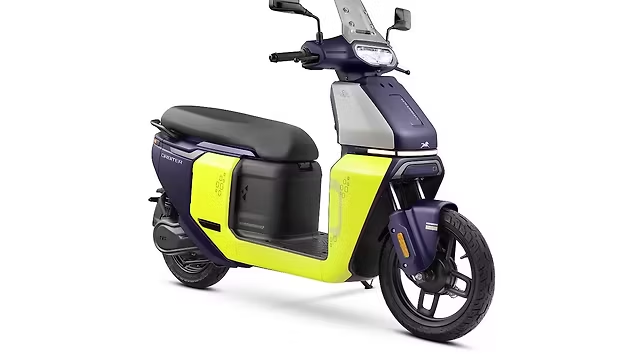TVS Orbiter Electric Scooter Launched in India at Rs. 99,900 ,The Indian electric vehicle (EV) market has been buzzing with launches over the past few years, and TVS Motor Company has just made a major splash with its brand-new electric scooter, TVS Orbiter, launched at an introductory price of Rs. 99,900 (ex-showroom, India). With affordability, innovation, and sustainability at its core, the Orbiter aims to revolutionize the way Indians commute on two wheels. Positioned as a stylish, tech-driven, and budget-friendly alternative in the growing EV space, the Orbiter is set to appeal to both young professionals and family riders alike.
In this article, we take a deep dive into the TVS Orbiter’s design, performance, features, pricing, competition, and its role in India’s EV ecosystem, to understand why this launch is being touted as a potential game-changer.
The Rise of Electric Scooters in India
Before looking at the Orbiter itself, it’s important to understand the context of India’s EV market. Over the last five years, electric two-wheelers have seen a massive surge in demand. Rising petrol prices, stricter emission norms, government incentives, and increased environmental awareness have pushed consumers toward EVs.
Companies like Ola Electric, Ather Energy, Bajaj Auto (with Chetak), Hero MotoCorp, and now TVS, are competing fiercely to grab a slice of this rapidly expanding segment. According to industry analysts, India’s EV two-wheeler market is projected to grow at a CAGR of over 35% till 2030, making it one of the fastest-growing EV markets globally.
TVS, which had earlier found success with its iQube electric scooter, has now doubled down with the Orbiter, offering a more affordable yet feature-rich model.
TVS Orbiter: Price and Variants
The TVS Orbiter has been launched at a highly competitive introductory price of Rs. 99,900 (ex-showroom), making it one of the most affordable premium electric scooters in India.
The company has introduced two variants:
- Orbiter Standard – priced at Rs. 99,900
- Orbiter Pro – priced at around Rs. 1.15 lakh (ex-showroom), offering a larger battery and extended range
By pricing the standard model under Rs. 1 lakh, TVS is directly targeting budget-conscious buyers while ensuring the Pro variant caters to those seeking longer range and advanced features.

Design and Styling
The Orbiter is built with a futuristic yet practical design philosophy. TVS has given it a sleek, aerodynamic body with sharp LED headlamps, a wide stance, and premium-quality plastics. Unlike many entry-level electric scooters, the Orbiter doesn’t compromise on looks.
Key design highlights include:
- Full-LED lighting setup (headlamps, DRLs, tail lamps, and indicators)
- 12-inch alloy wheels with tubeless tyres
- A digital instrument cluster with Bluetooth connectivity
- Dual-tone paint schemes in sporty shades like Midnight Blue, Pearl White, Charcoal Black, and Scarlet Red
The Orbiter strikes a balance between youthful appeal and family-friendly practicality, making it suitable for riders of all ages.
Performance and Range
One of the most crucial aspects of any electric scooter is its performance and battery range. The TVS Orbiter has been engineered to address both city commute efficiency and occasional long rides.
- Motor: The Orbiter is powered by a 4 kW hub-mounted electric motor that delivers a top speed of 85 kmph.
- Acceleration: It can sprint from 0–40 kmph in just 3.5 seconds, which is quick enough for zippy city rides.
- Battery: The Standard variant comes with a 2.9 kWh lithium-ion battery, while the Pro variant offers a 3.6 kWh battery pack.
- Range:
- Orbiter Standard – up to 110 km per charge
- Orbiter Pro – up to 150 km per charge
- Charging: The Orbiter supports both standard home charging (0–80% in 4 hours) and fast charging (0–80% in 1 hour).
With these specs, the Orbiter comfortably meets the needs of daily city commuters who typically ride between 20–50 km a day.
Features and Technology
TVS has packed the Orbiter with modern features and smart connectivity options, ensuring it appeals to the tech-savvy generation.
Some of the key features include:
- Smart TFT Instrument Console: Displays speed, range, battery status, and ride modes.
- Bluetooth & App Connectivity: Turn-by-turn navigation, ride analytics, geofencing, and anti-theft alerts via TVS SmartXonnect app.
- Multiple Riding Modes: Eco, City, and Sport modes for different riding preferences.
- Reverse Mode: Assists in moving the scooter backward in tight spaces.
- Regenerative Braking: Helps recharge the battery while braking, enhancing efficiency.
- Keyless Operation: Orbiter can be started using a smart key or mobile app.
These features make the Orbiter stand out in its price bracket, competing directly with Ola S1 Air, Ather 450S, and Bajaj Chetak Urbane.
Comfort and Practicality
TVS has ensured that the Orbiter is not just stylish but also practical. With India’s traffic conditions and family usage in mind, the scooter comes equipped with:
- Spacious under-seat storage (30 liters) – enough to fit a full-face helmet.
- Flat floorboard for carrying bags or groceries.
- USB charging port for mobile devices.
- Telescopic front suspension and dual-shock absorbers at the rear for comfortable rides.
- Front and rear disc brakes with combi-braking system (CBS) for safety.
These additions make the Orbiter well-suited for both urban commuters and small families who use scooters as a primary vehicle.
Government Incentives and Savings
Being an EV, the Orbiter qualifies for FAME-II subsidies and various state-level incentives. Depending on the state, buyers could save anywhere between Rs. 10,000 to Rs. 25,000, further lowering the effective cost.
Additionally, EVs enjoy low running costs, with Orbiter costing just around Rs. 0.20 per km, compared to petrol scooters that cost over Rs. 2.5 per km. Over a 5-year period, owners can save up to Rs. 70,000–90,000 in fuel expenses.
Competition Check
The Orbiter enters a segment already crowded with strong players. Here’s how it stacks up against rivals:
- Ola S1 Air: Similar price, but Orbiter has TVS’s trusted dealership network advantage.
- Ather 450S: Slightly higher priced, but Ather is known for its sporty design. Orbiter offers more practicality.
- Bajaj Chetak Urbane: Retro appeal, but Orbiter provides better range and modern tech.
- Hero Vida V1: Another competitor, though pricing is higher than Orbiter.
With its competitive pricing and balanced offering, Orbiter has the potential to emerge as a top-selling EV in this segment.
TVS’s EV Vision
The launch of Orbiter is not just about one scooter—it’s a part of TVS’s larger EV roadmap. The company has already invested heavily in electric mobility and aims to electrify a significant portion of its portfolio by 2030.
The Orbiter will be manufactured at TVS’s state-of-the-art facility in Hosur, Tamil Nadu, which has been upgraded for EV production. The company has also partnered with multiple charging infrastructure providers to set up public charging points across cities.
Customer Expectations and Market Impact
Given the success of the TVS iQube, expectations from Orbiter are sky-high. Early customer reviews highlight the scooter’s value-for-money positioning, premium looks, and robust after-sales service.
Analysts believe that the Orbiter could help TVS capture a 20% share of the Indian electric scooter market by 2026, positioning it as a strong rival to Ola Electric and Ather Energy.
Conclusion
The launch of the TVS Orbiter at Rs. 99,900 marks a significant milestone in India’s EV journey. With its stylish design, practical features, competitive pricing, impressive range, and brand reliability, the Orbiter ticks almost every box for urban commuters looking for a smart, affordable, and eco-friendly mobility solution.
By targeting both first-time EV buyers and experienced riders seeking a reliable daily commuter, TVS has ensured that the Orbiter appeals to a wide audience.
As India accelerates towards sustainable mobility, the Orbiter could well be the scooter that convinces the masses to switch from petrol to electric—quietly, efficiently, and affordably.



